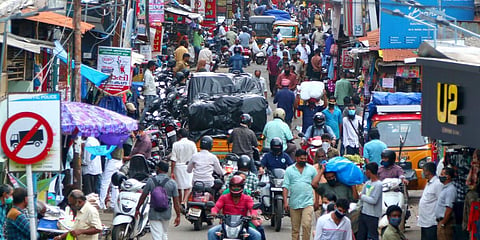

THIRUVANANTHAPURAM: The outcome of a serosurveillance study in three districts has turned the spotlight, yet again, on the extent of community transmission of COVID-19 in the state.
Out of 1,193 samples tested in Ernakulam, Thrissur and Palakkad, the study found indications of past infection as four samples were positive for Immunoglobulin G (IgG) -- an antibody that develops in most patients within seven to 10 days after the onset of COVID-19 symptoms.
Though the sample size of the study carried out by the Indian Council of Medical Research (ICMR) is low, the finding, coupled with the increasing number of cases with unknown sources of infection, has triggered doubts of the state having entered the third stage of infection transmission.
However, the state government is keeping a stoic silence on the finding, which was announced by the COVID-19 Outbreak Control and Prevention State Cell in its bulletin on June 18. "Kerala already has many cases, including COVID-19 deaths, whose sources of infection remain untraceable. While the sero-surveillance finding has been placed on record, it is unclear where these four cases were reported from and how the persons got infected. The crucial factor will be whether they infected others," said an officer with the health department told TNIE.
Meanwhile, a member of the state rapid response team for COVID-19 vouched for silent transmission and the presence of asymptomatic carriers, going by the trends emerging from new cases. "Some COVID-19 cases are being identified through sentinel surveillance. But many people may have slipped out of the surveillance net. It cannot be stated indisputably that superspreaders were not present in society," the member said.
‘Show the courage to call a spade a spade’
AIDS Society of India president, Dr Ishwar Gilada, a consultant in HIV and infectious diseases, said the presence of cases with unknown sources of infection point to community transmission. "The authorities concerned should show the courage to speak plainly about unfolding developments," Gilada said.
However, he said the low sample size of the serosurveillance study made its outcome insignificant. "Samples taken in April or early May will show low positivity rates. It could be higher now. Four positive cases out of 1,193 is a very low positivity rate. If this rate is greater than the PCR positivity rate, then we will have to be cautious," he said.
According to Dr Anup Warrier, head of infectious diseases and infection control at Aster Medcity in Kochi, the possibility exists of the state having community transmission or silent transmission at very low levels. But he ruled out the presence of any significant community transmission. "Such a scenario will reflect in high hospital admissions and ICU bed occupancies, like in Mumbai or Delhi," he said.
Sero-surveillance
Sero-surveys help understand the proportion of the population exposed to the SARS-CoV-2 infection, including asymptomatic individuals. Depending on the level of the seroprevalence of infection, appropriate public health intervention can be planned and implemented for the prevention and control of the disease.
Immunoglobulin G
An antibody that develops in most patients within seven to ten days after the onset of Covid-19 symptoms. Immunoglobulin G (IgG) remains in the blood after an infection has passed. The presence of the antibody indicates that one may have had COVID-19 in the recent past.